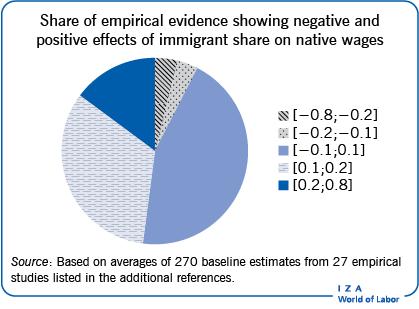Elevator pitch
Politicians, the media, and the public express concern that immigrants depress wages by competing with native workers, but 30 years of empirical research provide little supporting evidence to this claim. Most studies for industrialized countries have found no effect on wages, on average, and only modest effects on wage differentials between more and less educated immigrant and native workers. Native workers’ wages have been insulated by differences in skills, adjustments in local demand and technology, production expansion, and specialization of native workers as immigration rises.

Key findings
Pros
Immigration has a very small effect on the average wages of native workers.
There is little evidence of immigration lowering the wages of less educated native workers.
In the long term, immigration, especially of high-skilled workers, increases innovation and the skill mix, with potentially positive productivity effects.
In many countries, the share of graduate workers is higher for immigrants than for native workers.
Firms have absorbed immigrants by adopting appropriate technologies, expanding production, and moving native workers into more communication-intensive jobs.
Cons
There is some evidence of a negative effect of newly settled immigrants on the wages of earlier immigrants.
The positive wage effects of immigration are weaker in countries with rigid labor markets, which may even experience some negative employment effects.
In some southern European countries, immigrants have been more concentrated among less educated workers.